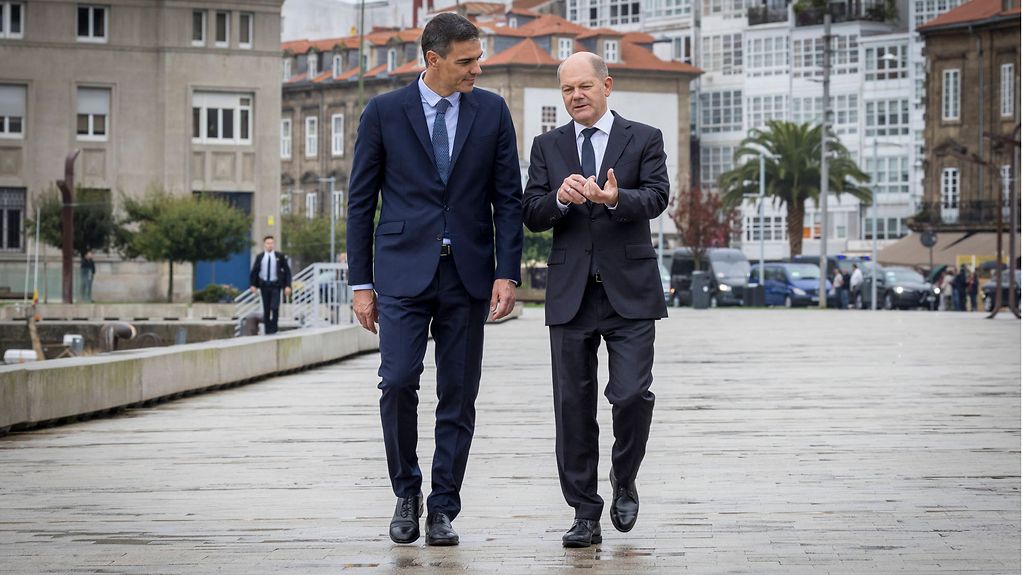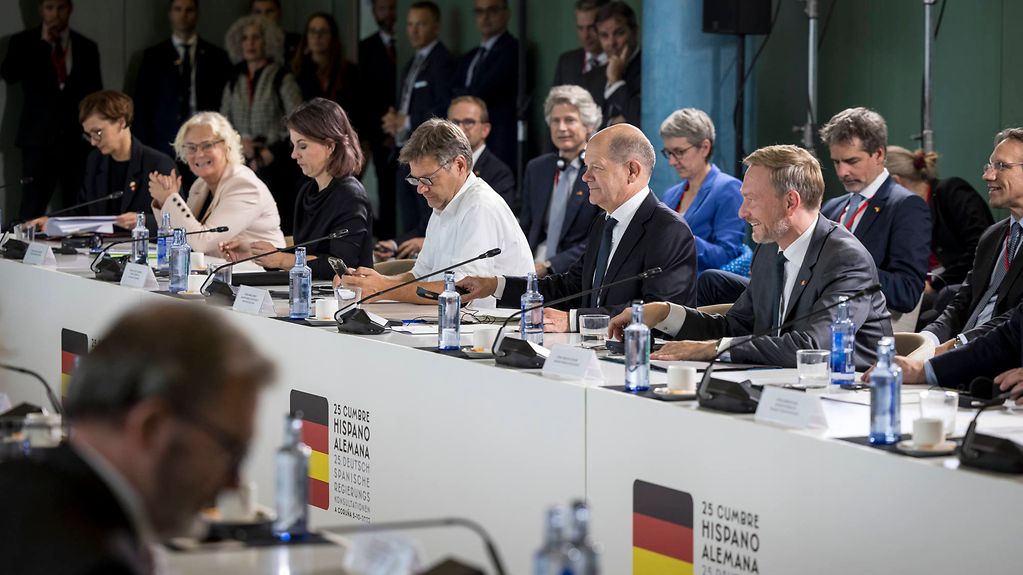German-Spanish intergovernmental consultations
Federal Chancellor Scholz said at the German-Spanish intergovernmental consultations in A Coruña that Germany and Spain will continue their support for Ukraine against Russian aggression. "As far as we are concerned," the Federal Chancellor said, the annexations of Ukrainian territory are "null and void." Scholz paid tribute to Spain as one of Germany's closest partners both within the European Union (EU) and the North Atlantic Treaty Organisation (NATO).

Chancellor Scholz and his ministers met with the Spanish government in A Coruña.
Photo: Federal Government/Köhler
"Germany and Spain," said the Federal Chancellor during the 25th German-Spanish intergovernmental consultations, "are bound together by friendship: we share the same values and fundamental principles. Ours is a partnership which is proving its special value, particularly in these challenging times." The Federal Chancellor and his cabinet met with Prime Minister Pedro Sánchez and the Spanish government in A Coruña on Wednesday.
Working together to develop the EU
The Federal Chancellor referred to Spain as one of Germany's closest partners within the EU and as an extremely reliable NATO ally, adding that: "We have very similar views on many of the challenges facing us both in Europe and around the world."
Both countries, he continued, want to further develop the EU, streamline its decision-making processes, and increase its geopolitical significance. "Pedro, I'm glad we're working side by side and hand in hand here."
Russian annexations "null and void"
The greatest current challenge of our time, said Chancellor Scholz, "is the Russian invasion of Ukraine". Russia, he continued, had profoundly shaken the rules-based international order as well as the European security order and that everyone agrees that: "Ukraine's sovereignty and territorial integrity are inviolable. The annexation of parts of Ukrainian territory is illegal under international law and is devoid of any substance. From our perspective, it is null and void."
Continuing support for Ukraine
Germany and Spain and their partners, he said, would continue to support Ukraine's resistance against Putin's brutal war, diplomatically, financially, and by continuing to supply weapons.
"The reason we are doing this is because we are united by the conviction that we want to put the imperialist era and the darkest hours of the 20th century behind us," said the Federal Chancellor: "We stand shoulder to shoulder behind the idea of a Europe in which the dignity of the individual is the highest priority and not the power hunger of individual state leaders."

Federal Chancellor Scholz and Spanish Prime Minister Sánchez: "We want to strengthen international collaboration."
Photo: Federal Government/Kühler
What are intergovernmental consultations?
Germany holds intergovernmental consultations with Brazil, China, France, India, Israel, Italy, the Netherlands, Poland, Spain, and Turkey, among others. The first intergovernmental consultations with Great Britain are scheduled to take place in 2023. The purpose of these meetings is to foster closer relations with other states. The special thing about it is that it is not only heads of state who take part in these events, but also government ministers. This enables the countries concerned to deepen their collaboration on specific topics.
Close bilateral collaboration
The 25th German-Spanish intergovernmental consultations, Scholz said, demonstrated the close and intensive bilateral relations and the friendship between the two countries. whose collaborative efforts ranged from foreign, security, and defence policy to cooperation in the fields of economics and energy, as well as research and education. "I am delighted to announce that two relevant agreements have been signed today," said Scholz.
Decarbonisation: harnessing great potential
According to Scholz, there is great potential for a much closer collaboration, such as in terms of energy policy: there are many opportunities for collaboration between the two countries, especially in areas such as renewable energies and hydrogen, with a view to accelerating decarbonisation whilst maintaining prosperity and competitiveness.
The development of a pipeline infrastructure, he added, is also a key aspect of securing the energy supply: "It would be possible to connect the Iberian Peninsula and Central Europe via MidCat to transport hydrogen in the future," said the Federal Chancellor adding that he is campaigning openly for this pipeline.
2022 as "a kind of German-Spanish year"
The fact that 2022 is a kind of "German-Spanish year" also shows how close the relationship is, Scholz noted. For example, Prime Minister Sánchez attended the Federal Government's Closed Cabinet meeting in Meseberg at the end of August, during which the Federal Government discussed the National Security Strategy, and Germany is now looking forward to the state visit of King Felipe of Spain in October. In addition, Scholz welcomed Spain as the guest country at the Frankfurt Book Fair this year, where its representatives will be presenting developments and trends in the country's literary and cultural life.
What all this shows, Scholz says, is that "our relationship is exceptionally close and of a long-term nature. Our wish is to build upon this partnership for the benefit of our two countries and peoples, but also for Europe as a whole – for a strong, sovereign, and sustainable Europe."